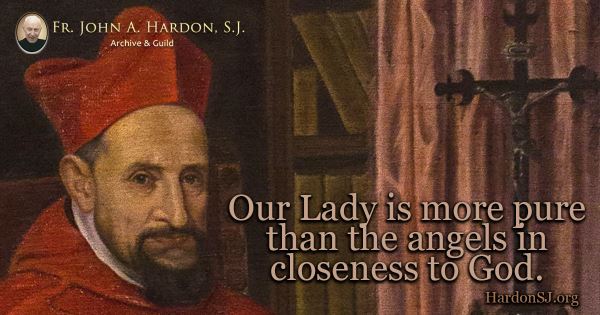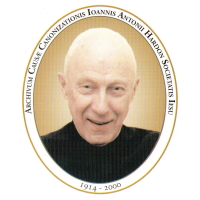According to available evidence, Robert Bellarmine was the first bishop of the Catholic Church to have formally petitioned the Holy See for a definition of the Immaculate Conception. It was made while he was serving as cardinal member of the Congregation of the Inquisition. The petition is dated August 31, 1627, and carried two main questions: Is the Immaculate Conception of the Blessed Virgin definable doctrine; and is it expedient at the present time to define this doctrine? Then follow three thousand words of careful theological exposition and answering of objections, calculated to break down the resistance of certain critics in the Roman Curia.
One of the reasons which Bellarmine gives in favor of the definition is especially revealing. “Is it possible,” he says, “for a mere creature to be without any sin. Such, for example, are the good angels in heaven. Consequently, the same must be true of the Virgin Mother of God, who is more pure than the angels. Otherwise she would be less pure than the angels, at least by the presence of sin. For true purity consists of two qualities: absence of sin and nearness to God.” The point is that if Our Lady is more pure than the angels in closeness to God, which all admit, then she is also as pure as they in the absence of sin, since purity comprehends both qualities without discrimination.
St. Robert’s devotion to the Immaculate Conception is also attested by the number of sermons which he preached on this prerogative of the Mother of God. Besides other testimony, there are two extant letters which Bellarmine wrote on the subject: one in 1617 to an English priest, and another in 1618 to Philip III of Spain, in both of which he promised to do everything in his power to promote the defense of the Immaculate Conception.
Juan de Serayz, previously quoted, testified at the Beatification Process that Bellarmine had a singular devotion to the Immaculate Conception. After this general statement, he added that, “his devotion was manifested in all the Roman Congregations on which the Cardinal served. And relative to this question, he often told me that he would not rest until the doctrine was defined. ‘There is no need of convoking a General Council in this matter,’ he said, ‘since the Pontiff can easily pronounce the definition by means of a papal bull.’ ” It is significant that when Pius IX defined the dogma in 1854, he did so without convoking a General Council and by means of a papal bull, exactly as Bellarmine had suggested.
It was Bellarmine’s mind that the definition of the Immaculate Conception in his own day was not only opportune but even necessary, as he wrote to King Philip, “to remove the terrible scandals which are daily committed against the honor of God and with such danger to the souls of the faithful.”
Only two months before his death, Bellarmine was still urging the cherished definition. On August 1, 1621, says the chronicle, St. Robert engaged the Holy Father in a long conversation, and frankly told him that if he were Pope he would not hesitate immediately to define the Immaculate Conception, seeing no obstacle whatever standing in the way.
St. John Berchmans died on August 13, 1621. Shortly after his death, Bellarmine heard of the vow which John had made, signed with his own blood, and declaring, “I, John Berchmans, unworthy son of the Society of Jesus, promise thee and thy Son … that until death I will ever declare and defend thy Immaculate Conception.” When the aged cardinal was informed of this fact, he exclaimed, “What a marvelous act of devotion! What an ingenious expression of love, written in his own blood! What he says is most certainly true. I am sure he was inspired to this action by Our Lady herself. For just now in Flanders, while others are attacking Mary’s honor, this young man from Flanders has been chosen by the Mother of God to defend her.” Bellarmine was referring to the forerunners of Jansenism at Louvain, who were teaching that, “No one except Christ is without original sin. Consequently the Blessed Virgin died because of the sin which she had contracted from Adam.”

